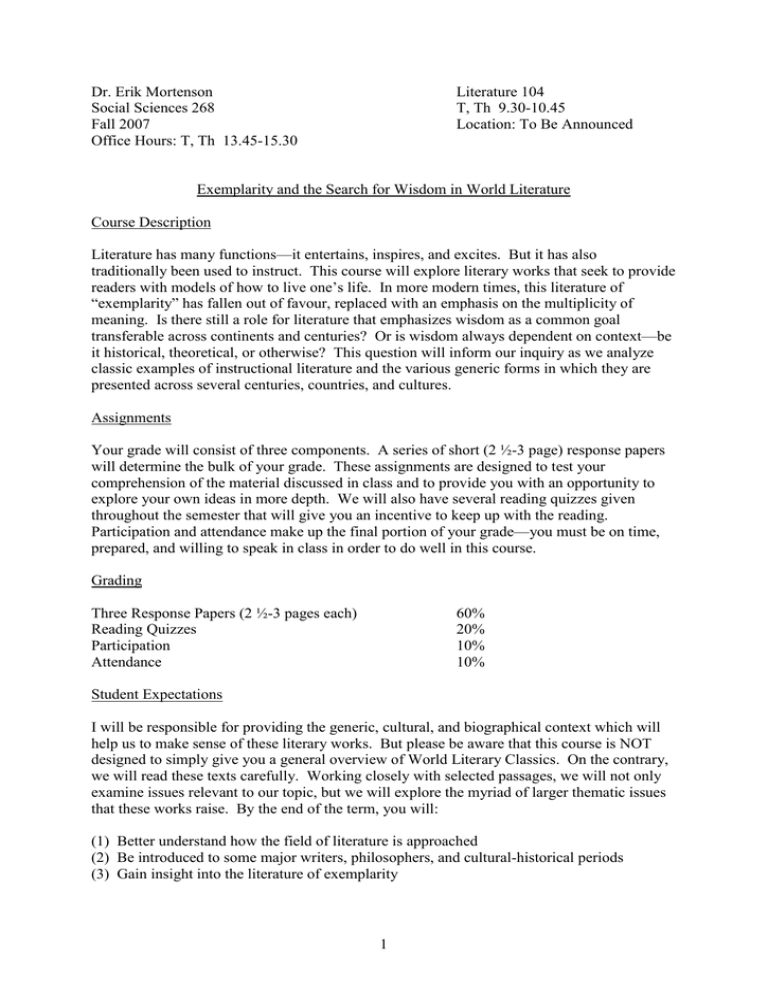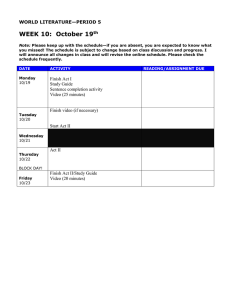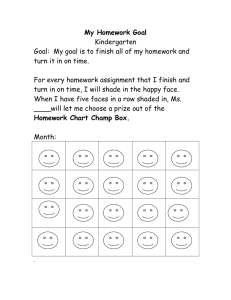Dr. Erik Mortenson Literature 104 Social Sciences 268
advertisement

Dr. Erik Mortenson Social Sciences 268 Fall 2007 Office Hours: T, Th 13.45-15.30 Literature 104 T, Th 9.30-10.45 Location: To Be Announced Exemplarity and the Search for Wisdom in World Literature Course Description Literature has many functions—it entertains, inspires, and excites. But it has also traditionally been used to instruct. This course will explore literary works that seek to provide readers with models of how to live one’s life. In more modern times, this literature of “exemplarity” has fallen out of favour, replaced with an emphasis on the multiplicity of meaning. Is there still a role for literature that emphasizes wisdom as a common goal transferable across continents and centuries? Or is wisdom always dependent on context—be it historical, theoretical, or otherwise? This question will inform our inquiry as we analyze classic examples of instructional literature and the various generic forms in which they are presented across several centuries, countries, and cultures. Assignments Your grade will consist of three components. A series of short (2 ½-3 page) response papers will determine the bulk of your grade. These assignments are designed to test your comprehension of the material discussed in class and to provide you with an opportunity to explore your own ideas in more depth. We will also have several reading quizzes given throughout the semester that will give you an incentive to keep up with the reading. Participation and attendance make up the final portion of your grade—you must be on time, prepared, and willing to speak in class in order to do well in this course. Grading Three Response Papers (2 ½-3 pages each) Reading Quizzes Participation Attendance 60% 20% 10% 10% Student Expectations I will be responsible for providing the generic, cultural, and biographical context which will help us to make sense of these literary works. But please be aware that this course is NOT designed to simply give you a general overview of World Literary Classics. On the contrary, we will read these texts carefully. Working closely with selected passages, we will not only examine issues relevant to our topic, but we will explore the myriad of larger thematic issues that these works raise. By the end of the term, you will: (1) Better understand how the field of literature is approached (2) Be introduced to some major writers, philosophers, and cultural-historical periods (3) Gain insight into the literature of exemplarity 1 Perhaps even more importantly, you will also: (1) Engage the ideas and themes in these texts in order to improve critical thinking skills (2) Become better readers and better writers (3) Hone your ability to read, write, and speak the English language Instructor Expectations In order to make this course enjoyable for everyone (myself included), I ask you to bring two things to every session—an open mind and a respect for others. I expect everyone to listen attentively to their colleague and to contribute positively to the discussion. For this class to work, you need to arrive having done the reading and prepared to speak. Make sure to buy (and use) a dictionary—I hold every student accountable for understanding the material at a basic level. Please turn off your cell phones, do not arrive late or leave early, and be quiet when others are talking. Literature is as interesting as you want to make it, so let’s enjoy ourselves this semester! Policy on Plagiarism The principle of honesty is recognized as fundamental to a scholarly community. Students are expected to honour this principle—any student caught plagiarizing the work of another will be expelled from the course and subject to further disciplinary action. If you are unsure what constitutes plagiarism, see me before handing in your work. Attendance Policy You are expected to attend every session of the course. If you are absent, it is your responsibility to find out what we covered that day and to get a copy of materials handed out in class. Attendance grades will be calculated as follows—if you attend 90% of class meetings you get an “A” for participation, 80% a “B,” and so on. Every three times you are late counts as an absence. To be considered present you must be on time with the course materials for that day. Tentative Schedule (Subject to Change) Sept. 18 (T) 20 (Th) 25 (T) 27 (Th) Hand out syllabus Introduction to course Aesop’s fables Aesop continued Oct. Confucius, from The Analects; Discuss Paper #1 finish Confucius Jalaloddin Rumi, from Collected Poems Şeker Bayramı—No class finish Rumi Michel de Montaigne, from Essays; Paper #1 Due finish Montaigne Begin Voltaire’s Candide Candide 2 (T) 4 (Th) 9 (T) 11 (Th) 16 (T) 18 (Th) 23 (T) 25 (Th) 30 (T) 2 Nov. 1 (Th) 6 (T) 8 (Th) 13 (T) 15 (Th) 20 (T) 22 (Th) 27 (T) 29 (Th) Workshop Paper #1; Discuss Paper #2 Candide Candide finish Candide Jorge Luis Borges, from Labyrinths finish Borges Franz Kafka’s parables; Paper #2 due finish Kafka Italo Calvino, from Invisible Cities Dec. Workshop Paper #2; discuss Paper #3 finish Calvino Brothers Grimm Fairytales, “Little Red Riding Hood” Angela Carter, “In the Company of Wolves” Film: Richard Linklater’s Waking Life Waking Life Discuss Waking Life; Paper #3 due Summary of Course 4 (T) 6 (Th) 11 (T) 13 (Th) 18 (T) 20 (Th) 25 (T) 27 (Th) 3


